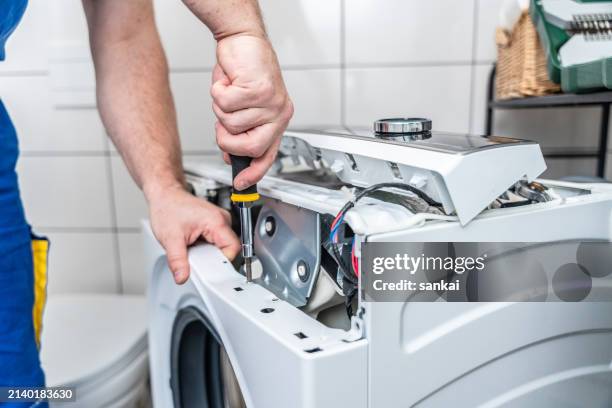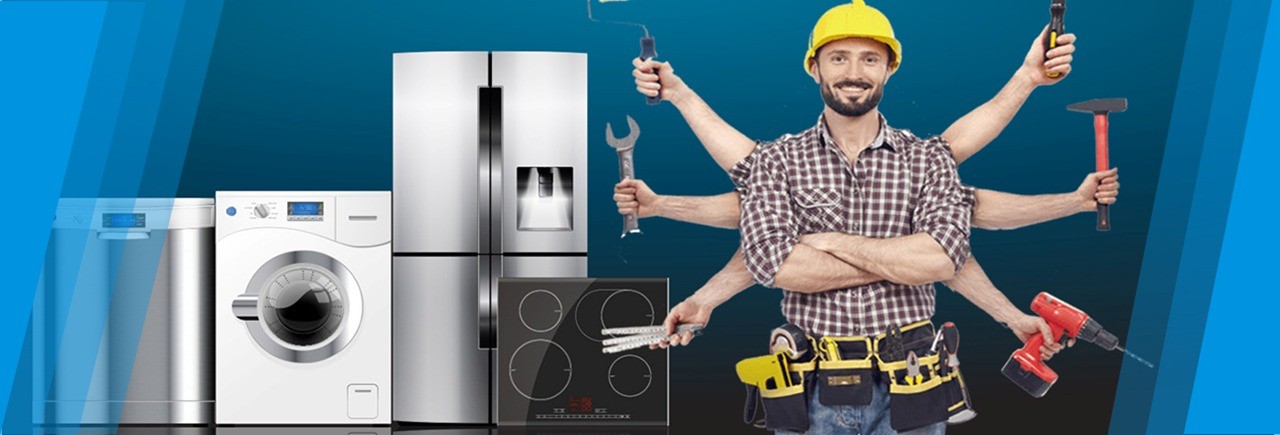Why Your Washing Machine Won’t Drain – Dependable Refrigeration & Appliance Repair Service Washing Machine Repair
Why Your Washing Machine Won’t Drain – Dependable Refrigeration & Appliance Repair Service Washing Machine Repair
Blog Article
The Ultimate Overview to Comprehending Device Fixing at Home
When your fridge quits cooling down or your oven declines to warm, it can really feel overwhelming. Comprehending appliance repair service in your home can conserve you time and money. You'll discover to identify signs, make use of important tools, and follow a systematic troubleshooting procedure. However before you begin, there are critical safety and security preventative measures you need to take into consideration. What are one of the most common issues, and how can you repair them? Allow's explore the fundamentals.
Usual Appliance Issues and Their Symptoms
When your appliances start acting up, it's necessary to acknowledge the indicators at an early stage. Neglecting them can result in bigger issues and expensive fixings. As an example, if your fridge isn't cooling effectively, you might see cozy places or condensation developing. This can show a failing compressor or an obstructed vent.Your dishwasher may reveal problems with unclean recipes or uncommon noises throughout cycles. If you hear grinding or clanking, it's time to investigate.A washing maker that will not rotate or drain can leave you with soggy washing, recommending a clogged up drain or a malfunctioning pump.Lastly, if your oven's temperature level appears off or it takes permanently to pre-heat, you might be handling a malfunctioning thermostat. By staying alert to these symptoms, you can resolve issues before they intensify right into major repair work.
Crucial Tools for Device Repair
When you're tackling appliance repairs at home, having the right devices is necessary. Basic hand tools like screwdrivers and pliers will certainly aid you take apart and take care of numerous appliances, while electrical testing devices guarantee you're working securely with wiring. Let's look at what you need to begin on your repair trip.
Basic Hand Tools
Having the right tools is necessary for reliable device repair at home. Start with a reputable screwdriver set, including both flathead and Phillips kinds, as screws prevail in home appliance setting up. Pliers are also crucial; they aid with gripping, twisting, and cutting wires or little parts. A set of needle-nose pliers can reach difficult situations quickly. You'll need a great adjustable wrench for tightening up or loosening nuts and screws. An utility knife comes in handy for puncturing packaging or insulation. Don't forget a sturdy workbench or surface to securely organize your tools and parts. With these fundamental hand tools, you'll be well-prepared to take on most device repairs that come your means.
Electric Screening Devices
Alongside fundamental hand devices, electrical testing devices play an important duty in home appliance fixing. These devices help you identify electrical concerns and guarantee home appliances work securely. A multimeter is important; it determines voltage, current, and resistance, allowing you to pinpoint troubles promptly. A non-contact voltage tester is one more must-have, letting you detect real-time cords without making direct call, enhancing your safety. Secure meters are terrific for determining present flow in wires without detaching them, conserving you time and initiative. Additionally, circuit testers can promptly examine if outlets are operating effectively. By making use of these gadgets, you'll improve your troubleshooting process and improve your fixing skills, making appliance upkeep a whole lot simpler.
Step-by-Step Overview to Diagnosing Home Appliance Issues
When your home appliance acts up, it can be aggravating, but identifying the problem does not need to be frustrating. You'll discover to recognize common problems and use efficient fixing techniques. Allow's go through the steps to get your device back in working order.
Typical Device Problems

Repairing Strategies Explained

Fixing Major Kitchen Area Appliances: A Closer Look
Have you ever wondered exactly how to tackle common concerns with your kitchen home appliances? Fixing significant kitchen devices like fridges, ovens, and dishwashers can be less complicated than you think. Start by determining the issue-- whether it's a refrigerator not cooling or a stove that won't heat. Usually, a basic reset or checking the source of power can solve the issue.For fridges, clean the condenser coils and examine the door seals. If your stove's not home heating, inspect the burner and thermostat. Dishwashing machines might just need a clean filter or a reset to get them back in activity. Constantly disconnect the home appliance before diving into repairs to assure your safety.Don' t neglect to seek advice from the individual manual for certain repairing pointers associated with your version. With a little bit of persistence and the right devices, you can with confidence deal with home appliance fixings and conserve cash at the same time!

Repairing Laundry Devices: Tips and Techniques
When your laundry devices start acting up, it can really feel frustrating, yet fixing them doesn't have to be an inconvenience. Begin by checking the power supply. Confirm the home appliance is plugged in and the outlet is functioning. Next off, check the door or cover switch; a damaged button can prevent the machine from operating.For washing machines, if it's not rotating, inspect for unbalanced tons. Rearranging the clothing may fix the problem. If your dryer isn't heating, tidy the lint filter and inspect the air vent for blockages.Listen for uncommon sounds; they can indicate a problem. If your home appliance is leaking, inspect the hose pipes for splits or loose connections. Record any kind of error codes shown on electronic displays, as they can lead you in determining the issue. Consult the customer manual for details repairing tips associated to your model.
Security Preventative Measures to Take Throughout Services
Before you begin any type of home appliance repairs, it's important to focus on security to avoid accidents or injuries. Initially, disconnect the home appliance or turn off the circuit breaker to assure like it no power reaches it while you function. Use insulated tools to reduce the danger of electrical shock. Put on security goggles and gloves to secure on your own from sharp edges or debris (Lg Dryer repair near me Dependable Refrigeration & Appliance Repair Service).Make certain your work space is neat and well-lit, so you can see what you're doing. Maintain youngsters and pet dogs away from the location to stay clear of disturbances and prospective risks. If you're managing gas appliances, be additional careful; check for leakages before proceeding.Take your time, and don't rush via fixings. If you really feel unpredictable regarding any kind of action, it's better to stop and research study than to presume. Following these safety measures will certainly assist develop a more secure environment for your do it yourself device repair work job
When to Call an Expert for Help
Just how do you know if it's time to contact an expert for appliance fixings? If you've attempted fundamental troubleshooting without success, it's a clear indication. If your home appliance still will not begin or reveals uncommon sounds after resetting it, do not wait to look for professional help.When you see leakages, smoke, or burning scents, focus on safety and call a pro quickly. These concerns can lead to even more significant damage or position dangers to your home.Also, if your appliance is under guarantee, getting in touch with a specialist is typically the best path. They can assure that repairs will not nullify your guarantee, saving you cash in the long run.Finally, if you're unsure or awkward with complex fixings, it's important to leave it to the specialists. Keep in mind, tackling complex problems without the appropriate know-how can bring about costly mistakes. Count on an expert when unsure!
Often Asked Concerns
Exactly How Can I Prevent Device Problems in the Future?
To stop appliance issues in the future, you need to perform normal upkeep, look for deterioration, tidy filters, and avoid overloading. Staying proactive will assist expand their life expectancy and maintain them running smoothly.
What Are one of the most Typical DIY Device Fixing Mistakes?
You might ignore security preventative measures, skip troubleshooting steps, or use inaccurate tools when trying DIY device repair work. Rushing the procedure or disregarding manufacturer standards can cause more significant problems and expensive blunders. Keep client and educated!
Exactly how Do I Know if a Component Needs Replacement?
You can inform if a part needs replacement by inspecting for unusual sounds, leaks, or irregular performance. If the appliance battles to run appropriately or shows noticeable damages, it's most likely time for a replacement.
Can I Utilize Generic Components for Home Appliance Repairs?
Yes, you can utilize common components for appliance repair work, yet establish they work - Kenmore Dryer Repair Oro Valley Dependable Refrigeration & Appliance Repair Service. Common parts might save you cash, yet they might impact performance or long life, so consider your alternatives meticulously before deciding
What Service Warranties Cover Home Appliance Repair Works?
A lot of home appliance service warranties cover repair services for manufacturing issues, but they often leave out damages from misuse. Check your service warranty terms very carefully, as some look at this now might call for utilizing certified service technicians and original parts for coverage to continue to be valid.
Report this page